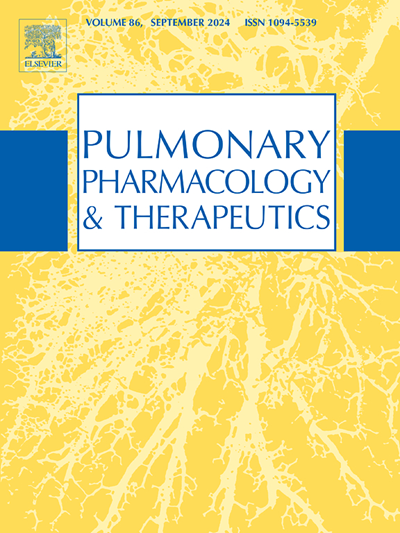Targeting the immunometabolism interface: A novel strategy for IPF therapy
IF 2.8
3区 医学
Q2 PHARMACOLOGY & PHARMACY
引用次数: 0
Abstract
Idiopathic pulmonary fibrosis (IPF) is a chronic, progressive interstitial lung disease characterized by aberrant tissue remodeling and excessive deposition of extracellular matrix components. Emerging evidence underscores the critical role of the immunometabolism in the pathogenesis of IPF, highlighting how dysregulated metabolic pathways modulate immune responses and contribute to fibrotic progression. Key molecular regulators such as PPARG (peroxisome proliferator activated receptor gamma) and SPP1 (secreted phosphoprotein 1), along with signaling pathways including mammalian target of rapamycin (mTOR), AMP-activated protein kinase (AMPK), and hypoxia-inducible factor 1-alpha (HIF-1α), orchestrate immune cell polarization, fibroblast activation, and extracellular matrix production. These insights reveal promising therapeutic targets at the intersection of metabolism and immunity. This review synthesizes current findings on immunometabolism interactions in IPF, emphasizing the potential of metabolic reprogramming and immune modulation as novel treatment strategies. Despite substantial advances, significant challenges persist in elucidating the precise mechanisms underlying these interactions and translating preclinical insights into effective clinical interventions. Future research should prioritize the identification of actionable metabolic biomarkers, refinement of molecular targets, and development of personalized therapeutic approaches. Addressing these gaps may pave the way for innovative therapies capable of halting or even reversing fibrosis, ultimately improving outcomes for patients with IPF.
靶向免疫代谢界面:IPF治疗的新策略
特发性肺纤维化(IPF)是一种慢性进行性间质性肺疾病,其特征是异常组织重塑和细胞外基质成分过度沉积。新出现的证据强调了免疫代谢在IPF发病机制中的关键作用,强调了失调的代谢途径如何调节免疫反应并促进纤维化进展。关键的分子调节因子,如PPARG(过氧化物酶体增殖体激活受体γ)和SPP1(分泌磷酸化蛋白1),以及包括哺乳动物雷帕霉素靶点(mTOR)、amp激活蛋白激酶(AMPK)和缺氧诱导因子1- α (HIF-1α)在内的信号通路,协调免疫细胞极化、成纤维细胞激活和细胞外基质的产生。这些见解揭示了代谢和免疫交叉的有希望的治疗靶点。本文综述了IPF中免疫代谢相互作用的最新研究结果,强调了代谢重编程和免疫调节作为新的治疗策略的潜力。尽管取得了重大进展,但在阐明这些相互作用的确切机制以及将临床前见解转化为有效的临床干预措施方面,仍然存在重大挑战。未来的研究应优先确定可操作的代谢生物标志物,改进分子靶点,并开发个性化的治疗方法。解决这些空白可能为能够阻止甚至逆转纤维化的创新疗法铺平道路,最终改善IPF患者的预后。
本文章由计算机程序翻译,如有差异,请以英文原文为准。
求助全文
约1分钟内获得全文
求助全文
来源期刊
CiteScore
6.20
自引率
0.00%
发文量
41
审稿时长
42 days
期刊介绍:
Pulmonary Pharmacology and Therapeutics (formerly Pulmonary Pharmacology) is concerned with lung pharmacology from molecular to clinical aspects. The subject matter encompasses the major diseases of the lung including asthma, cystic fibrosis, pulmonary circulation, ARDS, carcinoma, bronchitis, emphysema and drug delivery. Laboratory and clinical research on man and animals will be considered including studies related to chemotherapy of cancer, tuberculosis and infection. In addition to original research papers the journal will include review articles and book reviews.
Research Areas Include:
• All major diseases of the lung
• Physiology
• Pathology
• Drug delivery
• Metabolism
• Pulmonary Toxicology.

 求助内容:
求助内容: 应助结果提醒方式:
应助结果提醒方式:


